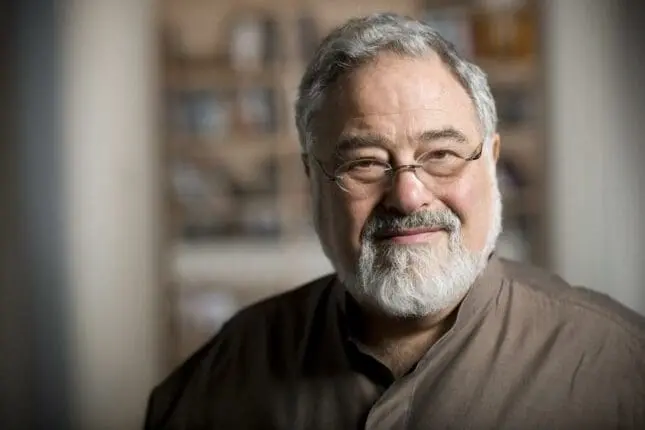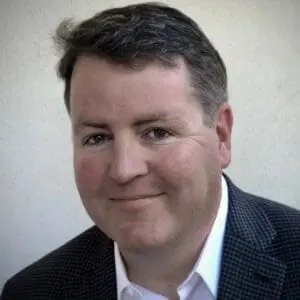Enjoy the audio preview version of this article—perfect for listening on the go.
George Lakoff uses his half-century of brain research to influence an unlikely field: national politics. In the 1990s, this professor of linguistics and cognitive science at the University of California, Berkeley, noticed how much conservative politicians dominated debates through carefully selected language and a focus on larger moral issues, while their liberal opponents struggled to find a common identity. He decided that he could aid the progressive cause with his unique perspective on language, metaphor, and neural circuitry.
While maintaining his cutting-edge research laboratory, which studies mirror neurons and the neural theory of language, Lakoff founded a progressive think tank, consulted with the Democratic Party, and penned five political titles, including Moral Politics, The Political Mind, and New York Times bestseller Don’t Think of an Elephant! Presidential candidate Howard Dean called him “one of the most influential political thinkers of the progressive movement,” and in 2008, The New York Times wrote that “No one has more brilliantly dissected conservative spin.” He kindly spared a moment between the laboratory and the podium to share some insights from his diverse career.
———
RH: What’s the connection between politics and psychology?
LAKOFF: Well, politics has everything to do with psychology.
RH: How? Please, do tell.
Lakoff: I have a book called Moral Politics, in which I showed that the conservative moral system comes out of a strict-father family structure; the progressive moral system comes out of a nurturing-parent family structure.
In a strict-father family, the father is the ultimate authority, and the one thing he must do is maintain that authority, through force if necessary. In addition, the father has to protect and support the family by competing with other people. It’s assumed that kids are born “bad” because they just do what feels good. You’ve heard the term “feel-good liberalism.” This means liberals haven’t learned morality.
RH: They need to be whipped into shape.
Lakoff: Exactly. The father does what he has to do to maintain authority, which could include lying or deception or beating people up or whatever, but the one thing that he can’t do is allow his authority to be undermined. It’s immoral for the strict father not to punish when the kids do something wrong, because, otherwise, they’ll be undisciplined. They support personal responsibility, not social responsibility. They’re responsible for their own lives, period. This maps directly onto conservative politics.
In a nurturing-parent family, the job of the parent is to be empathetic, to relate to the child, to understand how the child feels, and to give guidance, so the child knows what’s best for him or her. Parents maintain two-way communication and don’t just let kids do what feels good, but teach them to have empathy and to have social responsibility along with personal responsibility. Respect is earned by the nurturing parent, not expected as in the strict-father family. This correlates to a progressive moral system.
Now, there are a whole lot of patients out there who come from strict-father families and need a lot of therapy, a lot of nurturance. This is why a lot of therapy is set up to provide nurturance for people over a long period of time, and it takes a lot of time for those brains to change.
RH: Does your model recommend one system over the other?
Lakoff: The real question is what allows people to flourish. There’s been longitudinal research, in which they studied the personal and societal functioning of children from four kinds of families: strict-father (authoritarian), nurturing-parent (authoritative), permissive, and neglectful. It turns out that the authoritative, nurturing-parent model is best at this; the permissive model was second best; the strict-father/authoritarian model was third best; and the neglectful was awful.
RH: Can you give an example of nurturing-parent politics?
Lakoff: Barack Obama, when he campaigned. What he said was straightforward. His main theme was empathy, which he called “the basic thing my mother taught me.”
RH: Like Clinton’s “I feel your pain?”
Lakoff: More so, because Obama correctly pointed out that democracy is based on empathy. During the campaign, Anderson Cooper asked him what patriotism was, and he said, “Patriotism begins with citizens caring about each other.”
RH: Talk about turning it into a moral issue….
Lakoff: Yeah, it was perfect. That’s why we have principles like freedom and fairness and so on, right? If you watch his Father’s Day speech in 2008, he goes to a black church in Chicago, and he’s talking to men who’ve abandoned their families. And he says, “What kind of man are you? You have no sense of responsibility and no sense of empathy. You should be going back to your family and listening to them and seeing what they need and empathizing with them; being responsible for yourself, taking care of yourself and others, and raising your children to do the same thing.”
RH: Being the authoritative parent.
Lakoff: Yes, but not the authoritarian parent. What he says is the family should be run on empathy, social responsibility, and personal responsibility. You should also be teaching your children about caring for other people, because, otherwise, you’ll have a generation of people who don’t care about anybody. And in the next sentence he says, “The government should work in the same way.”
RH: Did you directly influence the Obama campaign?
Lakoff: In the summer of 2006, I visited Obama in his office at his invitation. I gave him a pre-publication copy of Thinking Points and met with his speechwriter, who had well-thumbed copies of my books on his desk.
If you look at Thinking Points, you can see similarities to Obama’s campaign strategy. I can’t say for sure whether they actually used that book. Obama made a small number of mistakes during the campaign. I got messages to him as to how to fix them, and in a day or two, they were fixed. After the campaign, I was thanked informally by various people in the campaign. That’s all I know. I have no idea how much I actually helped.
RH: You’ve said that voters are driven more by morals than self-interest. Can you explain?
Lakoff: Take the healthcare debate. In 2009, the Obama administration took a poll and found that most people were in favor of provisions like “no preconditions” and such. So they started promoting their plan with a list of two-dozen items that people liked. They didn’t talk about it in moral terms at all; they talked about it in policy terms, and how it would be in people’s self-interest.
Then the conservatives said, “We’re going to kill it on moral terms.” They framed their argument around two moral principles: freedom and life. Freedom, as in “They’re planning a government takeover,” and life, as in “They have death panels.” They defined the debate as a moral issue and repeated it over and over. So now you had people in the polls who were against the bill as a whole, but strongly in favor of all of its provisions.
Obama then gave a speech in which he said, “Look, we’re just going to go out to Town Hall meetings and tell you the truth about our policies,” and he gave his list of 24 positions, and just to make it easier to remember, presented them in three groups of eight. Now, Ryan, do you remember the three groups of eight?
RH: Um … I’m afraid I don’t recall.
Lakoff: Nobody remembers three groups of eight! Any cognitive scientist will tell you, nobody is going to remember three groups of eight policies! So that’s a simple example of what I’m talking about. Two-dozen policy issues based on the polls are impossible to remember. Two moral principles, like freedom and life, stick with you.
RH: What role does cognitive science play in today’s political discourse?
Lakoff: Well, a lot of people are trying to look at language, framing, and metaphor, and they find it difficult. It takes a lot of skill to apply this knowledge, and we don’t have institutions set up to do it. I had a think tank for a while, but during the 2008 nomination campaign, we stopped because the money went to the campaign. I get calls literally every day from progressive organizations wanting help. People in PR aren’t trained to do it. The pollsters aren’t trained to do it. You need to have people trained in cognitive science to do it. I’m working on this all the time.
RH: And that’s what conservatives have done: they’ve spent a lot of time training.
Lakoff: Conservatives spend a lot of time, but they also invest in it. You see, we progressives spend more money, but we don’t spend it in the right way. Our foundations give to the environment or antipoverty work or whatever, but not to framing. We invest in people who are trained in fields like political science and economics and public policy and law, but not linguistic and cognitive science. Many think that framing comes afterward and is just about language, not about ideas. They miss the point.
RH: As we enter another presidential race, is there anything nonpoliticians can do to make a difference?
Lakoff: Politicians can only say things that have been said thousands of times before. That means that it’s up to nonpolitician progressives to change public discourse. I’ve written five books and developed a website to help them do that.
Ryan Howes
Ryan Howes, Ph.D., ABPP is a Pasadena, California-based psychologist, musician, and author of the “Mental Health Journal for Men.” Learn more at ryanhowes.net.













